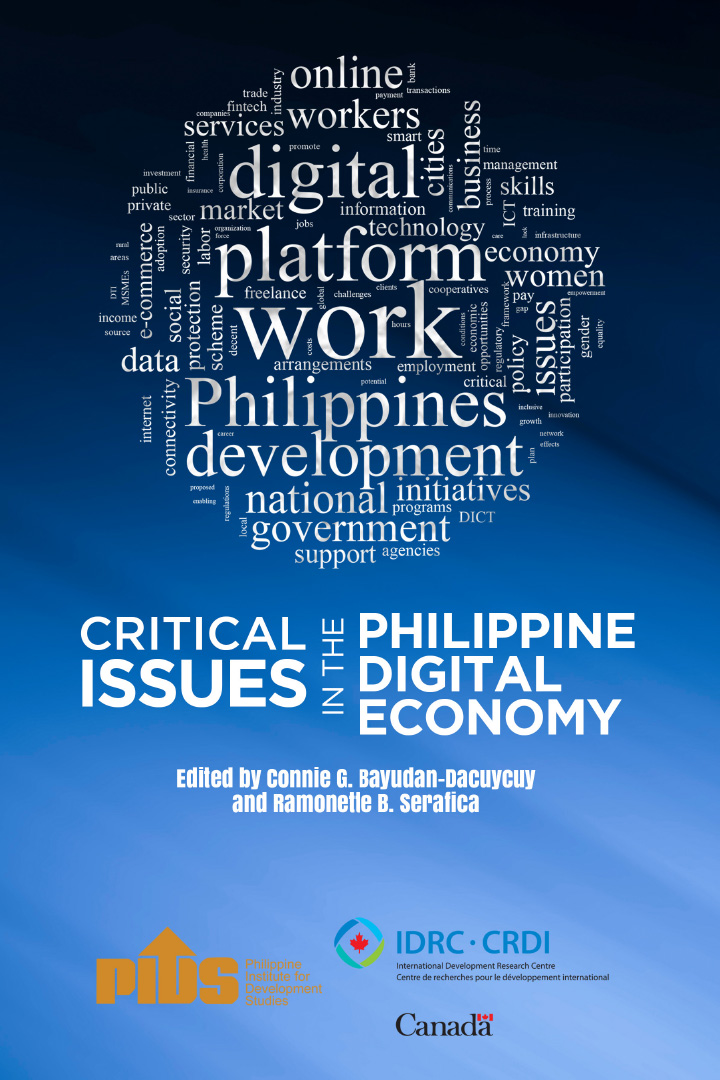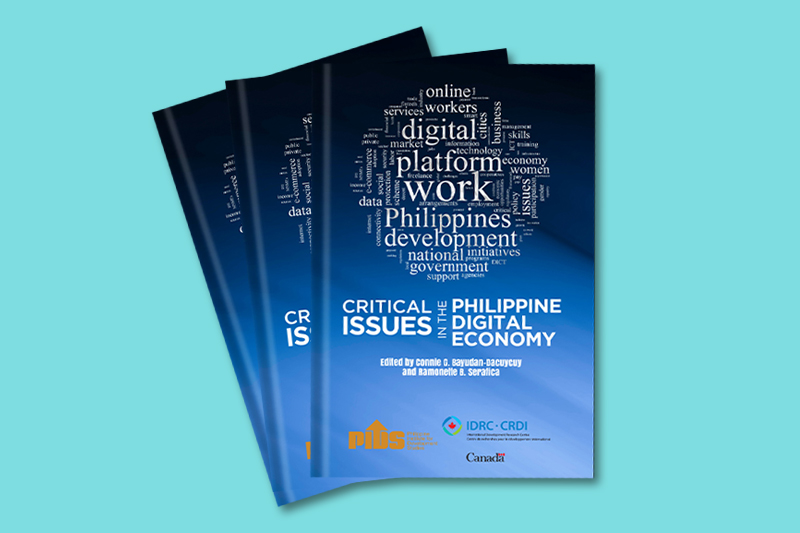
Online platforms offer livelihood opportunities for women who cannot participate in the formal economy.
This is according to a study of the Philippine Institute for Development Studies (PIDS) titled “Expanded Data Analysis and Policy Research for National ICT Household Survey 2019” authored by PIDS Senior Research Fellows Jose Ramon G. Albert and Francis Mark A. Quimba, Research Fellow Aubrey D. Tabuga, Consultant Mary Grace Mirandilla-Santos, former Supervising Research Specialist Maureen Ane D. Rosellon, Research Specialist Jana Flor V. Vizmanos, Research Analyst Mika S. Muñoz, and former Research Analyst Carlos C. Cabaero.
The authors analyzed the results of the 2019 National ICT Household Survey to help the government develop and evaluate policies and strategies related to information and communications technology (ICT), including measures to address issues such as the digital divide.
They also looked into ICT access and use relative to the living conditions and livelihood of households, skills of individuals (particularly in mobile telephony and internet), and sharing of equipment within a household.
According to Albert, who presented the study at a webinar conducted by PIDS recently, a slightly bigger share of female internet users (5%) engaged in online selling than men (4%).
However, the survey found that, on average, male online sellers earn more than their female counterparts, at PHP 10,898 compared to PHP 6,041, respectively. But Albert noted that this observation needs further research “to firmly establish whether this disparity is purely gendered or attributable to other factors”.
The survey also showed that most women online sellers (25%) are employed workers. Meanwhile, self-employed women and homemakers comprised 36 percent of online sellers.
“We conducted some basic econometric modeling and observed that engagement in online selling is more likely for women, married individuals, and more educated persons. Holders of ICT degrees are also more likely to enter into online selling,” Albert said.
He added that the likelihood of getting into online selling increases with age but decreases at a certain threshold. “As a person grows older, there is a greater chance of engaging in online selling, but this reverses among older people,” he said.
Further, Albert mentioned that those who live in the rural areas are less likely to engage in online selling and that “unemployed, self-employed, and students are likely to sell online than employed individuals.”
“Homemakers are less likely to engage in online selling compared to employed workers,” he added.
Albert and his coauthors gave some recommendations to harness and take advantage of the potential of online platforms.
One is for the government to pursue policies for reskilling the workforce and enhancing the educational capacity of the population.
“The country needs to regularly measure and monitor digital skills—both life skills and competencies for work. Training the older population and less educated concerning the practical applications of ICT, as well as enhancing the general population’s knowledge and usage of online platforms in conducting online transactions, will equitably improve the population’s ability to benefit from ICT,” the study said.
Specifically, the study urged the government to focus on current and future training programs that will enhance both men's and women's online business and employment skills.
Furthermore, it emphasized the need to improve the country’s ICT-related infrastructure, such as mobile internet connection, to enable greater use of ICT platforms by both women and men. ###
You may watch the webinar at https://fb.watch/9waP228TbF/ or https://youtu.be/j6q40hWF--o.
For more videos of PIDS events, go to https://www.pids.gov.ph/videos.
This is according to a study of the Philippine Institute for Development Studies (PIDS) titled “Expanded Data Analysis and Policy Research for National ICT Household Survey 2019” authored by PIDS Senior Research Fellows Jose Ramon G. Albert and Francis Mark A. Quimba, Research Fellow Aubrey D. Tabuga, Consultant Mary Grace Mirandilla-Santos, former Supervising Research Specialist Maureen Ane D. Rosellon, Research Specialist Jana Flor V. Vizmanos, Research Analyst Mika S. Muñoz, and former Research Analyst Carlos C. Cabaero.
The authors analyzed the results of the 2019 National ICT Household Survey to help the government develop and evaluate policies and strategies related to information and communications technology (ICT), including measures to address issues such as the digital divide.
They also looked into ICT access and use relative to the living conditions and livelihood of households, skills of individuals (particularly in mobile telephony and internet), and sharing of equipment within a household.
According to Albert, who presented the study at a webinar conducted by PIDS recently, a slightly bigger share of female internet users (5%) engaged in online selling than men (4%).
However, the survey found that, on average, male online sellers earn more than their female counterparts, at PHP 10,898 compared to PHP 6,041, respectively. But Albert noted that this observation needs further research “to firmly establish whether this disparity is purely gendered or attributable to other factors”.
The survey also showed that most women online sellers (25%) are employed workers. Meanwhile, self-employed women and homemakers comprised 36 percent of online sellers.
“We conducted some basic econometric modeling and observed that engagement in online selling is more likely for women, married individuals, and more educated persons. Holders of ICT degrees are also more likely to enter into online selling,” Albert said.
He added that the likelihood of getting into online selling increases with age but decreases at a certain threshold. “As a person grows older, there is a greater chance of engaging in online selling, but this reverses among older people,” he said.
Further, Albert mentioned that those who live in the rural areas are less likely to engage in online selling and that “unemployed, self-employed, and students are likely to sell online than employed individuals.”
“Homemakers are less likely to engage in online selling compared to employed workers,” he added.
Albert and his coauthors gave some recommendations to harness and take advantage of the potential of online platforms.
One is for the government to pursue policies for reskilling the workforce and enhancing the educational capacity of the population.
“The country needs to regularly measure and monitor digital skills—both life skills and competencies for work. Training the older population and less educated concerning the practical applications of ICT, as well as enhancing the general population’s knowledge and usage of online platforms in conducting online transactions, will equitably improve the population’s ability to benefit from ICT,” the study said.
Specifically, the study urged the government to focus on current and future training programs that will enhance both men's and women's online business and employment skills.
Furthermore, it emphasized the need to improve the country’s ICT-related infrastructure, such as mobile internet connection, to enable greater use of ICT platforms by both women and men. ###
You may watch the webinar at https://fb.watch/9waP228TbF/ or https://youtu.be/j6q40hWF--o.
For more videos of PIDS events, go to https://www.pids.gov.ph/videos.












